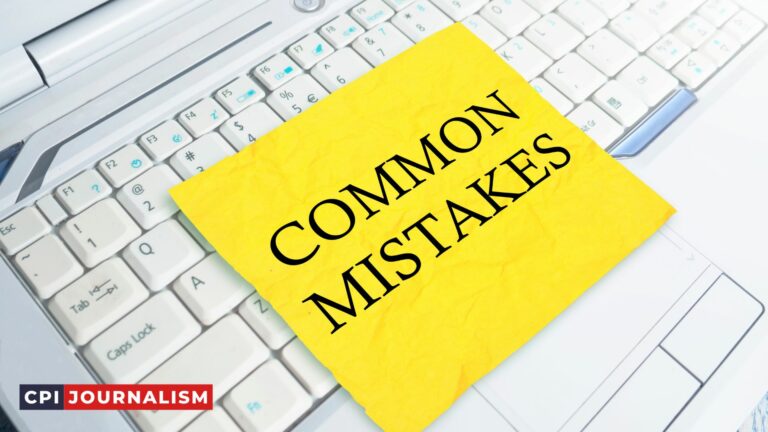What Are the Challenges and Risks Involved in Investigating Sensitive or Controversial Topics?
As an experienced journalist, I understand the complexities and risks involved in investigating sensitive or controversial topics.
It takes a special kind of courage and dedication to pursue stories that may be challenging, uncomfortable, or even dangerous.
In this article, I will discuss the unique challenges and risks associated with investigating sensitive or controversial topics, and how to mitigate them. I will also provide advice for novice journalists who are considering taking on such stories.
A. Definition of Sensitive or Controversial Topics
As a journalist, it is important to understand the different types of topics that can be considered sensitive or controversial. Generally, these topics are those that involve a wide range of views and opinions and can be deeply personal or emotionally charged.
They can include topics such as politics, religion, social issues, race, gender, sexuality, health, and more. While these topics are often difficult to investigate, they can lead to powerful and impactful stories.
When investigating sensitive or controversial topics, it is important to be aware of the potential risks and challenges that can arise.
It is important to approach these topics with respect and sensitivity, and always be mindful of the potential for harm or offense that could be caused by the reporting.
It is essential to approach these stories with an open mind and to take the time to understand the nuances and complexities of the story.
Additionally, it is important to consider potential sources when investigating these topics. It is important to seek out a diverse range of voices and perspectives, and to ensure that all sources are treated with respect and dignity.
It is also important to consider any potential bias that could be present in sources, and to use caution when relying on sources that are not verified.
Overall, it is important to remember that sensitive or controversial topics can be difficult to investigate, but they can also lead to powerful and impactful stories.
It is essential to approach these stories with respect, sensitivity, and an open mind, and to consider potential risks and challenges that may arise.
B. Overview of Challenges and Risks Involved in Investigating Sensitive or Controversial Topics
As an experienced journalist, it is important to be aware of the potential challenges and risks that can arise when investigating sensitive or controversial topics.
The most significant risks include:
1. Threats to Your Safety: When reporting on sensitive or controversial subjects, you may be subject to threats and intimidation from those involved.
You may also be exposed to physical danger, including violence or even death. It is important to take the necessary safety precautions and have a contingency plan in place to protect yourself.
2. Legal Risks: Depending on the subject you are investigating, you may be exposed to legal risks. These can include lawsuits, defamation, or even criminal charges.
It is important to understand and respect the laws of the jurisdiction in which you are working and take steps to protect yourself from potential legal risks.
3. Reputational Risks: When reporting on sensitive or controversial topics, your reputation may be at risk.
You may be subject to criticism or even ostracization by colleagues or members of the public. It is important to consider the potential reputational risks before embarking on such a project.
4. Emotional Risks: Investigating sensitive or controversial topics can be emotionally taxing. You may be exposed to difficult stories and difficult emotions. It is important to be aware of the emotional impact of such reporting and to seek out support when needed.
By being aware of the potential challenges and risks involved in reporting on sensitive or controversial topics, you will be better prepared to handle the situation.
It is important to have a plan in place to protect yourself and your reputation and to seek out support when needed.
Challenges Of Investigating Sensitive Or Controversial Topics
Investigating sensitive or controversial topics can present numerous challenges, both personal and professional, to journalists. It is essential that journalists understand these potential risks and be prepared to confront them in order to successfully tackle these stories.
First and foremost, journalists must be aware of how their stories may be perceived. Depending on the topic, the public may have strong feelings of either support or opposition.
It is important for journalists to be cognizant of this before diving in and to understand the potential ramifications of their work. This could mean researching multiple sides of an issue to ensure that all perspectives are given a fair hearing.
Second, journalists should be aware of any legal implications that may accompany their work. Laws vary from state to state, country to country, and it is essential to understand the legal ramifications of any story.
This could mean consulting with a lawyer to fully understand the legal implications of the story and the implications of any potential sources.
Third, journalists should be aware of the potential safety risks associated with sensitive or controversial topics.
It is essential to be aware of potential dangers and take the necessary steps to ensure a safe working environment. This could mean researching potential sources, speaking to experts in the field, and taking extra precautions while in the field.
Finally, journalists should be aware of the emotional toll that these stories can take. It is important to be cognizant of any emotional triggers that the story might contain and to be mindful of how their work might affect the people they are interviewing.
It is also essential to take the necessary steps to ensure their mental and emotional wellbeing and to seek out appropriate professional help if necessary.
In conclusion, investigating sensitive and controversial topics presents numerous challenges to journalists. It is essential for journalists to be aware of the potential risks and to take the necessary steps to mitigate them in order to ensure a successful outcome.
A. Access to Information
As an investigative journalist, one of the biggest challenges you will face when investigating sensitive or controversial topics is gaining access to accurate, reliable information.
In many cases, the parties most likely to have the information you need may be reluctant to cooperate with you, or may even actively try to obstruct your efforts.
Even when willing sources are available, gathering accurate information about sensitive or controversial topics can be difficult.
Information may be incomplete, biased, or even deliberately falsified. As a journalist, you have a responsibility to ensure that the information you use is reliable and verifiable.
In some cases, investigative journalists may need to undertake covert or undercover operations to uncover information that would otherwise remain hidden. This can be a risky approach, and great care must be taken to ensure that the safety of the journalist and their subjects is not compromised.
In some cases, laws or regulations may be in place to restrict access to certain kinds of sensitive information or to protect certain kinds of sources. Journalists must be aware of these laws and regulations and take steps to ensure that they are not inadvertently breaking them.
Finally, investigative journalists must also take steps to protect the safety and security of their sources. In many cases, people may be willing to share information with you but may not want their names or identities revealed to the public. Protecting the anonymity of confidential sources can be a vital part of the investigative process.
B. Fear of Retaliation
As an experienced journalist, one of the biggest challenges and risks I have faced in investigating sensitive or controversial topics is the fear of retaliation. This can manifest in many different forms and poses a very real risk to journalists.
First, it can take the form of physical harm. When investigating topics such as corruption, organized crime, or human rights abuses, journalists may be in danger of being targeted by the people or organizations they are investigating. This may include physical threats or even physical violence.
Second, there is the risk of legal action. Journalists may be sued for defamation or breach of privacy or have their work censored by court orders. Governments may also use their powers to target journalists, such as through the use of libel laws or by withholding information.
Finally, there is the risk of financial harm. Journalists may be subject to economic sanctions, such as the revocation of press credentials or loss of advertising revenue. They may also face financial penalties such as fines or legal costs.
For these reasons, it is important for journalists to take precautions when investigating sensitive or controversial topics. They should be aware of the risks and take necessary steps to protect themselves and their sources.
This may include using secure communication tools, making use of encryption and anonymity tools, and taking steps to mitigate the risks of physical harm.
C. Lack Of Resources
Investigating sensitive or controversial topics can be an incredibly challenging and risky endeavor for journalists, especially due to a lack of resources.
Even with a strong commitment and dedication to the cause, journalists often find themselves limited by a lack of resources, including time, money, and access to information.
Given the sensitive nature of these topics, journalists may find themselves having to work through a number of obstacles in order to get to the information they need.
These obstacles may include getting access to confidential documents, gaining approval to interview certain people, or dealing with potential legal issues. All of these challenges can become compounded if a journalist is operating with limited resources.
In addition, journalists may also find themselves having to navigate around certain cultural or societal taboos or stigmas that may be associated with the topic they are investigating.
For example, if a journalist is investigating a sensitive topic in a foreign country, they may face language barriers or cultural misunderstandings that could prevent them from getting the information they need.
Given the challenges posed by a lack of resources, journalists investigating sensitive or controversial topics must be prepared for a long and difficult journey.
They must have the financial resources and time to dedicate to the cause and the ability to persevere through any obstacles that may arise. With a strong commitment and dedication to the cause, journalists can make a real impact in uncovering the truth.
D. Time Constraints
Investigating sensitive or controversial topics can be a tricky and time-consuming process. It often takes much longer to collect accurate information than it does for an average news piece.
For example, if a journalist is looking into a complex financial transaction, they may need to take the time to examine financial records and interview sources to get a full understanding of the story.
In addition, sensitive or controversial topics are often more difficult to investigate because the sources involved may not be willing to cooperate or speak openly. This can lead to a longer investigation process and can make it difficult to get the full picture of the story.
Time constraints can also become an issue when journalists investigate sensitive or controversial topics. This is especially true when news organizations have tight deadlines and need stories finished quickly.
In these cases, journalists may be forced to rush their investigation in order to meet the deadlines, which can lead to mistakes or omissions that could greatly affect the accuracy of the story.
Therefore, it is important for journalists to be aware of the time constraints they may face when investigating sensitive or controversial topics and to plan accordingly.
This may mean taking extra time to contact and interview sources, or using other investigative methods that can help get the information needed without compromising accuracy.
E. Language Barriers
Investigating sensitive or controversial topics can be a challenge for any journalist, especially if language barriers are involved. Language barriers can lead to a lack of access to resources and can impede the ability to gain trusted sources and information.
It is important to be aware of the language and cultural context of the topic being investigated, as well as the language of the people being interviewed.
If there is a language barrier, it is important to hire a translator who is knowledgeable and sensitive to the context of the investigation. This can help ensure that the information being provided is accurate and that the sources are being given the respect they deserve.
It is also important to be aware of the legal implications of language barriers. In some countries, it is illegal to translate or record conversations without the consent of those involved. Therefore, it is important to be aware of the laws of the country where the investigation is taking place.
In conclusion, language barriers can be a significant obstacle to conducting an effective investigation into sensitive or controversial topics.
It is important to be aware of the cultural context and legal implications of the investigation, and to hire a translator who is knowledgeable and sensitive to the context of the investigation.
With the right preparation, it is possible to conduct an effective investigation even in the presence of language barriers.
III. Risks of Investigating Sensitive or Controversial Topics
Investigating sensitive or controversial topics can be a difficult and dangerous task for journalists. It is important for upcoming journalists to be aware of the risks that come with such investigations, so that they can stay safe and protect their work.
The most obvious risk of investigating sensitive or controversial topics is physical danger. Journalists who investigate topics such as corruption or organized crime can be subject to threats or even violence.
For example, in some countries, journalists who report on corruption or human rights violations are often subject to harassment and intimidation by those in power.
Journalists who investigate sensitive and controversial topics can also be exposed to financial risk. Investigating powerful people or organizations can lead to costly lawsuits or other legal action.
For example, if a journalist reports on a powerful individual or organization and the report is false or misleading, the journalist could be sued for libel.
Finally, journalists who investigate sensitive or controversial topics may be subject to psychological risks. Investigating topics such as organized crime, political corruption, or human rights violations can be very emotionally and psychologically taxing.
Journalists may experience depression, anxiety, or post-traumatic stress from investigating such topics.
For upcoming journalists, it is important to be aware of the risks of investigating sensitive or controversial topics.
It is important to take precautionary measures to protect oneself, such as working with a partner, informing a trusted friend or family member of one’s whereabouts, and obtaining legal advice. By being aware of the risks, upcoming journalists can stay safe and protect their work.
A. Legal Risks
Investigating sensitive or controversial topics is not without its legal risks. As a journalist, it is important to be aware of the various laws and regulations that apply to the types of information you may be seeking.
For instance, depending on the jurisdiction, there may be laws that protect the privacy of certain individuals or entities, or prohibit the disclosure of certain types of information.
In addition, you may be subject to defamation laws, which protect individuals and organizations from false or damaging statements. To avoid potential legal troubles, it is important to ensure that all information gathered and presented is accurate and properly sourced.

Additionally, it is a good practice to provide any subjects of your investigation with an opportunity to respond or comment, and to give them a fair chance to do so.
Furthermore, depending on the type of information you are seeking, you may need to obtain permission from the relevant authorities before attempting to access certain documents or archives.
It is important to be aware of the various laws and regulations that may apply to your investigation, and to ensure that all steps taken are compliant with them.
Finally, you should be aware that some organizations and individuals may attempt to prevent you from publishing certain information, either through legal action or other means. It is important to be aware of these potential risks, and to have a plan in place to protect yourself should they arise.
B. Reputational Risks
Investigating sensitive or controversial topics can be a risky endeavor for both the journalist and the subject of the investigation.
Reputational risks can have both short-term and long-term consequences, so it is important for journalists to be aware of the potential risks and take steps to protect themselves from reputational harm.
The most obvious reputational risk is the potential for negative publicity. This can include criticism from the public, media outlets, or other organizations about the journalist’s reporting methods and conclusions. This can lead to a loss of credibility and trust, which can have a long-term impact on a journalist’s career.
In addition, journalists must be aware of the potential for legal action against them. They may be sued for defamation, invasion of privacy, or other claims. Journalists should familiarize themselves with applicable laws and consult with an attorney before publishing sensitive or controversial information.
Finally, journalists should take steps to protect their sources. If a source is identified, they can be exposed to legal action and other forms of reprisal. Journalists should take measures to protect the anonymity of their sources and be aware of the potential risks involved in publishing sensitive information.
C. Physical Risks
When investigating sensitive or controversial topics, physical risks should not be overlooked. Depending on the topic, journalists may be subject to physical threats or even attacks from those who are opposed to their work.
For example, journalists covering topics such as organized crime, corruption, war, or politics may be in danger of physical harm.
Journalists also need to take precautions when traveling to investigate a story. When entering a new country or region, they should be aware of the risks associated with the local environment, including civil unrest and violent crime.
It is important to take safety measures such as researching the local area, avoiding high-risk areas, and travelling with a trusted local guide.
Finally, journalists should also be mindful of their digital security when working on sensitive or controversial topics.
As digital technology becomes increasingly sophisticated and ubiquitous, it has become easier for governments, corporations and other entities to track journalists’ activities online.
Journalists should take necessary steps to protect their data and communications from interception, such as using encrypted messaging services, strong passwords and two-factor authentication.
D. Financial Risks
Investigating sensitive or controversial topics often comes with a hefty financial price tag. Journalists must be prepared to make significant investments in their research and reporting, and may be unable to recoup their costs.
One of the biggest financial risks is the cost of legal fees. It is essential for journalists to be cognizant of their rights and responsibilities when reporting on sensitive or controversial topics.
Before beginning their investigation, journalists should consult with a lawyer to ensure they are aware of any potential legal implications. Legal fees can quickly add up, and journalists must be prepared to cover these costs.
In addition to legal fees, journalists must also be aware of the potential costs of securing access to documents and records.

Depending on the jurisdiction and the type of information being sought, there can be significant costs associated with obtaining access to documents. These costs can include document retrieval fees, filing fees, and even travel expenses.
Finally, journalists must also factor in the potential costs of security. Sensitive or controversial topics may require journalists to take additional measures to protect their safety and the safety of their sources.
This can include hiring body guards, purchasing security equipment, and even relocating to another area. All of these costs must be accounted for when investigating sensitive or controversial topics.
It is important for journalists to understand the financial risks associated with investigating sensitive or controversial topics. Journalists should be aware of the potential costs and be prepared to make necessary investments in their research and reporting.
IV. Strategies for Investigating Sensitive or Controversial Topics
Investigating sensitive or controversial topics can be intimidating for journalists, but it is a crucial part of their job. It is important for journalists to be aware of the risks and challenges that come with such investigations and to have strategies in place to handle them.
Here are some strategies journalists should consider when investigating sensitive or controversial topics:
1. Consult with experienced journalists: Experienced journalists have likely encountered similar scenarios in the past and can provide valuable insight into the best approach to take.
Consulting with them can help journalists prepare for potential obstacles and determine the best investigative strategies.
2. Utilize trusted sources: Journalists should always seek out reliable sources when investigating sensitive or controversial topics. This will ensure that they receive accurate information while also protecting their safety.
It can also be beneficial to consult with specific community groups or individuals that are familiar with the issue or issue area.
3. Remain objective: In order to remain credible, journalists must strive to remain objective when investigating sensitive or controversial topics. This means avoiding personal biases and adhering to professional standards and ethical guidelines.
4. Protect yourself: Investing in personal safety is always a top priority for journalists. Journalists should look into protective measures such as bodyguards or personal alarms if they plan to travel to dangerous locations or conduct interviews with potentially volatile people.
5. Monitor the situation: Journalists should keep track of their investigations, as well as any changes in the situation or environment. This will help them stay aware of any potential risks or obstacles they may face while conducting their investigations.
By following these strategies, journalists can be better prepared to investigate sensitive or controversial topics. It is important for journalists to be aware of the risks and challenges that come with such investigations and to have strategies in place to handle them.
A. Establishing Trust
Investigating sensitive or controversial topics can be a difficult task for any journalist. It requires a great deal of trust between the journalist and their sources. Establishing trust with sources is a critical part of any investigation and is often the difference between success and failure.
When a journalist is investigating a sensitive or controversial topic, it is important to create an environment of trust and respect with the source.
This can be done by actively listening to the source, being honest and transparent with them, and showing genuine interest in their story. It is also important to ensure that confidentiality and anonymity is guaranteed if the source wishes to remain anonymous.
The journalist should also be aware of the potential risks to the source when they are sharing sensitive information. This means that the journalist must take steps to ensure that the source is secure and that the information is handled with the utmost respect for their safety and privacy.
Finally, the journalist must be aware of their own biases and prejudices when investigating a sensitive or controversial topic.
This means actively seeking out different perspectives and challenging their own beliefs. Understanding the complexities of the issue and being open to diverse opinions are essential for any successful investigation.
B. Utilizing Technology
As an experienced journalist, I am aware of the importance of leveraging technology when investigating sensitive or controversial topics.
Technology can be a powerful tool for gathering, verifying, and analyzing data, and for communicating with sources. But there are also risks associated with utilizing technology for such investigations.
First, there is the risk of data security and privacy. Journalists should be aware of the potential for their data and information to be accessed, monitored, or manipulated by third parties.
Encryption and other security measures should be employed to protect the integrity of data and information.
Second, journalists should be aware of the potential for their investigative activities to be exposed to a wider audience.
Technology can enable the rapid and wide dissemination of sensitive or controversial topics, which can lead to public scrutiny and backlash. Journalists should think carefully about the implications of how and when to publish their findings.
Finally, journalists should be aware of the implications of using technology to conduct investigations.
Technology can be used to quickly identify and verify sources, and to gather and analyze large amounts of data. But it can also be used to manipulate information, or to bully or intimidate sources. Journalists should be aware of the potential for misuse of technology.
In conclusion, journalists must be mindful of the potential risks associated with utilizing technology to investigate sensitive or controversial topics.
By being aware of the potential for data security and privacy issues, for wide dissemination of information, and for misuse of technology, journalists can take steps to protect themselves and their sources from the risks associated with such investigations.
C. Developing a Support Network
As an investigative journalist, you will likely encounter sensitive or controversial topics that could present a risk to your safety and mental wellbeing. It is important to develop a support network that you can turn to when needed.
First, create a list of people who can provide you with moral and emotional support. This list should include family, friends, colleagues, and mentors.
Additionally, it is important to have a source of practical support. This could include having a lawyer on retainer, having an emergency fund, or having a network of contacts who could provide you with resources or information.

It is also important to create a plan of action in the event that something goes wrong. This could include having an emergency contact who you can call in the event of an emergency, having a plan for how to handle threats or intimidation, or having a contingency plan in the event of a physical attack.
Finally, it is important to take steps to protect your digital security. This could include using a secure messaging app, using a VPN to protect your IP address, or using encryption to protect your data.
By developing a strong support network, you can ensure that you are protected and have access to the resources you need to investigate sensitive or controversial topics.
D. Utilizing Freedom of Information Laws
When it comes to sensitive or controversial topics, utilizing freedom of information laws can be incredibly helpful for investigative journalists. Freedom of information laws give citizens the right to access public records, which can be incredibly useful for investigative reporting.
It is important to note, however, that there are certain restrictions and limitations to what information is available. For example, in the United States, certain documents can be exempt from disclosure, such as those related to national security.
When utilizing freedom of information laws, it is important to understand the laws in the jurisdiction in which you are operating.
Different countries have different laws, and it is important to do your research and make sure you are familiar with the laws in your area. In some cases, you may need to make a written request for the information, and it can take some time for the request to be processed.
It is also important to note that some documents may not be available even if you make a request. Information can be withheld for a variety of reasons, such as if the information is considered confidential or if it would violate someone’s rights.
In addition, it is important to understand the implications of using freedom of information laws. In some cases, using freedom of information laws may lead to unintended consequences, such as revealing confidential information or putting someone in danger.
Therefore, it is important to weigh the risks and benefits before utilizing freedom of information laws.
Overall, utilizing freedom of information laws can be an invaluable tool for investigative journalism. However, it is important to understand the laws in your jurisdiction and the potential implications of using freedom of information laws.
E. Utilizing Investigative Journalism Techniques
Investigative journalism is an invaluable tool for uncovering and reporting on sensitive or controversial topics.
It can be a powerful way to shed light on stories that may otherwise remain hidden or under-reported. However, investigative journalism does come with numerous challenges and risks.
When it comes to investigative journalism techniques, there are many different approaches and techniques which can be employed. The key is to select the right ones for the task at hand.
Here are some of the techniques which can be used to investigate sensitive or controversial topics:
1. Conducting Interviews: Interviewing people who have knowledge or experience of the topic can be an invaluable source of information and evidence.
However, it is important to conduct interviews in a professional and ethical manner, taking into account the sensitive nature of the topic and the potential risks involved.
2. Accessing Official Documents: Official documents can be a great source of information, but it often involves navigating complex legal and bureaucratic processes in order to obtain access. It is important to understand the relevant laws and regulations, and to work with experienced lawyers if needed.
3. Analyzing Data: Investigative journalism often involves analyzing large amounts of data. It is important to understand the data and the various tools and techniques which can be used to analyze it.
4. Using Freedom of Information Requests: Freedom of information requests can be a powerful tool for gaining access to information which is otherwise inaccessible. It is important to understand the relevant laws and regulations, and to work with experienced lawyers if needed.
These are just some of the investigative journalism techniques which can be used to investigate sensitive or controversial topics.
It is important to understand the risks and challenges involved, and to use the right techniques for the job. With the right approach, investigative journalism can be a powerful tool for uncovering the truth.
V. Conclusion
Investigating sensitive or controversial topics can be a daunting and risky task, but it is necessary for journalists to understand the challenges, risks, and ethical considerations associated with it.
As experienced journalists, we must take the utmost care to ensure that our research and reporting is conducted professionally, ethically, and responsibly.
We must also be aware of the potential legal and safety risks that come with investigating sensitive topics, and take the necessary precautions to protect ourselves and our sources.
Furthermore, we must be aware of the potential for bias, and strive to remain objective and impartial in our reporting.
Ultimately, the success of any investigation into sensitive topics depends on the skill and dedication of the journalist. Thorough research, ethical considerations, and a commitment to remaining impartial and objective are key to conducting a successful investigation.
With a commitment to these principles, journalists can navigate the challenges and risks involved in investigating sensitive topics, and uncover the truth.
A. Summary of Challenges and Risks Involved in Investigating Sensitive or Controversial Topics
Investigating sensitive or controversial topics can be a difficult and dangerous task for journalists. These topics often involve considerable risks and challenges, which must be taken into account before proceeding.
The most common risks and challenges associated with investigating sensitive or controversial topics include the potential for physical danger, threats to personal safety, legal risks, and social or political repercussions.
Physical danger may arise from hostile or dangerous individuals, or from situations that become dangerous due to the presence of journalists. Threats to personal safety can include verbal or physical threats, or attempts to access private information.
Legal risks may include being sued by parties involved in the investigation or being charged with criminal charges. Finally, social or political repercussions can come in the form of criticism or backlash from the public or government.
In light of these risks and challenges, it is important for journalists to carefully evaluate and plan their investigations before proceeding. This includes assessing the potential risks and making sure that appropriate safety measures are taken.
It is also important to ensure that all relevant laws and regulations are being followed, and to be aware of the potential for public backlash. Finally, journalists should focus on producing balanced and accurate reports, and should be prepared to defend their work in the face of criticism.
B. Strategies for Overcoming Challenges and Risks
As an experienced journalist, I understand the challenges and risks associated with investigating sensitive or controversial topics. Over the years, I have developed a few strategies that have been successful in helping me to navigate these complex issues.
Here are some of my tips:
1. Have a plan: Before starting any investigation, it is important to have a clear plan of action. Establish a timeline, determine which sources you need to speak with, and craft a strategy for gathering information. Having a plan will help you stay focused and organized as you navigate difficult conversations.
2. Reach out to trusted sources: When researching sensitive subjects, it is important to find reliable sources. Reach out to people you trust and who have expertise in the subject matter. This will help you ensure that you are getting accurate information from credible sources.
3. Respect confidentiality: When speaking with sources, it is important to respect confidentiality. Be clear about why you are reaching out and make sure to maintain the anonymity of your sources. This will help protect their safety and ensure the integrity of your investigation.
4. Take your time: Investigating sensitive topics can be emotionally and mentally draining. It is important to take your time and be mindful of your own mental health. Pace yourself and be sure to take breaks when needed.
By following these strategies, you can successfully navigate the challenges and risks associated with investigating sensitive or controversial topics.
Remember to stay focused, respect confidentiality, and take care of yourself. Doing so will help ensure that your investigation is successful and ethical.







